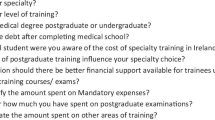Abstract
Background
Surgical residency training is a complex and costly task. Hospital economic health is dependent on different variables, but it is especially linked to the country macroeconomics that may be extremely fluctuating, especially in underdeveloped countries. This study analyzed the correlation between a single-center university hospital financial status and subjective perception of general surgery residents on program support and adequacy.
Methods
We surveyed former residents that started general surgery residency program in a tertiary university hospital between 1999 and 2017. Individuals answered a questionnaire about the perception of the influence of the hospital´s financial status on training. Hospital´s financial status was estimated yearly by the current liquidity ratio (CLR) that measures whether or not a company has enough resources to meet its short-term obligations.
Results
Two hundred and fifty-seven (96%) were still in surgical practice; 242 (93%) were satisfied with their residency training; 210 (78%) believed training was affected by financial status; 183 (68%) believed they were prepared for independent practice; 180 (67%) practiced in an academic environment; 146 (54%) felt the need to complete specialty training beyond residency; and 56 (21%) believed hospital financial status was adequate. The rate of positive or negative answers did not correlate with the current liquidity ratio, except for the need to complete specialty training that was indirectly related to CLR.
Conclusions
University hospital financial status did not influence subjective perception of general surgery residents on training, program support and adequacy.


Similar content being viewed by others

References
Porter ME (2010) What is value in health care? N Engl J Med 363(26):2477–2481
Lauer CI, Shabahang MM, Restivo B, Lane S, Hayek S, Dove J, Ellison HB, Pica E, Ryer EJ (2019) The value of surgical Graduate Medical Education (GME) programs within an integrated health care system. J Surg Educ 76(6):e173–e181. https://doi.org/10.1016/j.jsurg.2019.08.006
Bridges M, Diamond DL (1999) The financial impact of teaching surgical residents in the operating room. Am J Surg 177(1):28–32
Hartz AJ, Krakauer H, Kuhn EM et al (1989) Hospital characteristics and mortality rates. N Engl J Med 321:1720–1725
Quillin RC 3rd, Pritts TA, Hanseman DJ, Edwards MJ, Davis BR (2013) How residents learn predicts success in surgical residency. J Surg Educ 70(6):725–730
Chan M (2010) The path to universal health coverage [press release]. World Health Organization, Berlin. Available from: https://www.who.int/dg/speeches/2010/launch_WHR_20101122/en/index.html. Accessed 22 Nov 2010
Koenig L, Dobson A, Ho S, Siegel JM, Blumenthal D, Weissman JS (2003) Estimating the mission-related costs of teaching hospitals. Health Aff 22(6):112–122
Iannuzzi MC, Iannuzzi JC, Holtsbery A, Wright SM, Knohl SJ (2015) Comparing hospitalist-resident to hospitalist-midlevel practitioner team performance on length of stay and direct patient care cost. J Grad Med Educ 7(1):65–69
Fitzgerald JEF, Ravindra P, Lepore M, Armstrong A, Bhangu A, Maxwell-Armstrong CA (2013) Financial impact of surgical training on hospital economics: an income analysis of 1184 out-patient clinic consultations. Int J Surg 11(5):378–382
Bell RH (2011) National curricula, certification and credentialing. Surgeon 9(Suppl 1):S10–S11
Maślach D, Markiewicz J, Warelis A, Krzyżak M (2019) Importance of financial liquidity in hospital management. Przegl Epidemiol 73(3):369–381
Kowalska S (2013) Znaczenie płynności nansowej w zarządzaniu przedsiębiorstwem w sytuacjach kryzysowych. Zeszyty Naukowe Uniwersytetu Szczecińskiego. Finanse. Rynki Finansowe. Ubezpieczenia Nr 58:223–230
Potts JR (2018) Shifting sands of surgical education. J Am Coll Surg 227(2):151–162
Herbella FAM, Fuziy RA, Takassi GF, Dubecz A, Del grande J (2011) Evaluation of training and professional expectations of surgery residents. Rev Col Bras Cir 38(4):280
The Millennial Generation Research Review. Available at: https://www.uschamberfoundation.org/millennial-generation-research-review. Accessed 5 June 2015
Hoffman RL, Morris JB, Kelz RR (2016) Surgical residency training at a university-based academic medical center. Surg Clin North Am 96(1):59–70
Author information
Authors and Affiliations
Corresponding author
Ethics declarations
Conflict of interest
The authors have no other relevant financial or personal conflicts of interest to declare in relation to this paper.
Additional information
Publisher's Note
Springer Nature remains neutral with regard to jurisdictional claims in published maps and institutional affiliations.
Appendix
Appendix
Questionnaire model applied to former residents
Questions | |
|---|---|
Sex | |
Age | |
Year of residence | |
At your point of view, was your residency training in general surgery satisfactory? | (A) Yes (B) No |
Do you still working as a surgeon today? | (A) Yes (B) No Occupation area |
Did you need to complete specialty training after the residence of general surgery? | (A) Yes (B) No Which? |
Did you practice in academic environment? | (A) Yes B) No |
When you finished the residence of general surgery, were you prepared to work as a general surgery? | (A) Yes (B) No |
Do you believe that the financial situation of Hospital São Paulo when you were surgery resident affected your training? | (A) Yes (B) No |
In your opinion was the economic condition od Hospital São Paulo good when you were surgery resident? | (A) Yes (B) No |
Rights and permissions
About this article
Cite this article
Cassão, B.D., Herbella, F.A.M., dos Santos, M.C.E. et al. University Hospital Financial Status Does Not Influence Subjective Perception of General Surgery Residents on Training Adequacy. World J Surg 44, 2495–2500 (2020). https://doi.org/10.1007/s00268-020-05500-7
Published:
Issue Date:
DOI: https://doi.org/10.1007/s00268-020-05500-7



